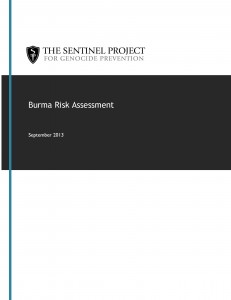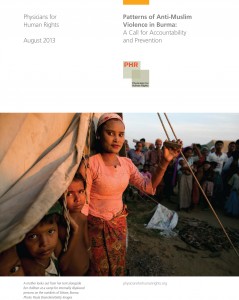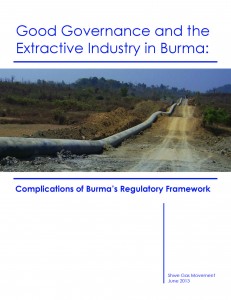Resources (827 found)
Rule By Law: An Analysis of the Use of Legislation to Stifle Civil Society Space in Burma
This paper is primarily an analysis of the raft of legislation that is in the process of being pushed through parliament to target HRDs, activists, protestors and CSOs, and the threat that such legislation poses to their fundamental rights – which Burma is legally bound to respect and protect under the 2008 Constitution. This paper will also look at the current situation of political prisoners to demonstrate how the legislation is being misused in collaboration with a compliant judiciary and the Myanmar National Human Rights Commission […]
• • •Burma Update: Serious Crimes Continue
This briefing paper summarizes crimes that have been committed in Burma over the last year. It details the ongoing abuses and restrictions against Rohingyas, continuing anti-muslim violence, restrictive legislations being used to arrest and prosecute activists, farmed and human rights defenders, and the Burma Army’s offensives against the Kachin Independence Army and other non-state armed groups despite peace agreements.
• • •68th Session of the UN General Assembly – Situation of human rights in Myanmar: Report of the Special Rapporteur on the situation of human rights in Myanmar, Tomas Ojea Quintana
In the present report to the United Nations General Assembly, the Special Rapporteur describes how the reforms under way in Myanmar continue to create the prospect of significant improvements in the human rights situation. Important developments during the reporting period include the continuing release of prisoners of conscience; improving respect of the right to freedom of opinion and expression; and progress towards agreement on a national ceasefire. The Special Rapporteur highlights, however, the dangers of glossing over shortcomings in the area of human rights or presuming that these shortcomings will inevitably be addressed through the momentum of current reforms […]
• • •Whose Guns Are Silent?: An Analysis of Burma’s Fractured Peace Process
This paper is an analysis of the current situation with recommendations to the parties concerned. It is based on interviews with representatives of ethnic non-state armed groups (NSAGs), community-based organizations and civil society groups. On a state visit to the United Kingdom in July, President Thein Sein stated, “Very possibly, over the coming weeks, we will have a nationwide ceasefire and the guns will go silent everywhere in Myanmar for the first time in more than 60 years.” There is a significant gap in the pronouncements of the Thein Sein government and the realities of the ground situation in Burma’s ethnic areas: this paper seeks to explain that gap […]
• • •Burma Risk Assessment
 Following extensive research, the Sentinel Project has concluded that the risk of genocide or related mass atrocities in Burma is extremely high. Despite recent democratic reforms in the country, violence, discrimination, and extrajudicial killings continue and are mostly directed toward the Muslim Rohingya minority in Rakhine state. Violence and other crimes against the Rohingya, which are conducted by both state and non-state groups, are both widespread and systematic […]
Following extensive research, the Sentinel Project has concluded that the risk of genocide or related mass atrocities in Burma is extremely high. Despite recent democratic reforms in the country, violence, discrimination, and extrajudicial killings continue and are mostly directed toward the Muslim Rohingya minority in Rakhine state. Violence and other crimes against the Rohingya, which are conducted by both state and non-state groups, are both widespread and systematic […]
EU Restoration of Myanmar Preferential Trade Regime: Neglect of Human Rights Concerns?
On 19 July 2013, the European Union brought Myanmar back into the so-called “Everything but Arms” regime, a preferential trade regime within the “Generalised Scheme of Preferences”. Although the EU claims this decision will facilitate the country’s path to democracy and development, it has been strongly criticised by numerous human rights organisations […]
• • •Patterns of Anti-Muslim Violence in Burma: A Call for Accountability and Prevention
 In this report, PHR documents how persecution of and violence against the Rohingya in Burma has spread to other Muslim communities throughout the country. PHR conducted eight separate investigations in Burma and the surrounding region between 2004 and 2013. PHR’s most recent field research in early 2013 indicates a need for renewed attention to violence against minorities and impunity for such crimes […]
In this report, PHR documents how persecution of and violence against the Rohingya in Burma has spread to other Muslim communities throughout the country. PHR conducted eight separate investigations in Burma and the surrounding region between 2004 and 2013. PHR’s most recent field research in early 2013 indicates a need for renewed attention to violence against minorities and impunity for such crimes […]
Business & Human Rights in Myanmar: A Round-Up of Recent Developments
This briefing summarises major business and human rights developments in Myanmar (Burma) from November 2010, when the country held its first elections after 20 years and pro-democracy leader Aung San Suu Kyi was released from house arrest, to the present. It covers the positive and negative impacts of companies operating in the country, and is based on reports from a range of sources that the Resource Centre has featured on its website and in its Weekly Updates. It also refers to responses we received from companies when we asked them to reply to concerns raised by civil society, and refers to the failure of certain companies to respond […]
• • •Council Conclusions on the Comprehensive Framework for the European Union’s Policy and Support to Myanmar/Burma
The Council adopted the following conclusions:
“The Council welcomes and endorses the attached Comprehensive Framework consisting of priorities for the European Union’s policy and support in the next three years to the on-going reforms in Myanmar/Burma. This Framework sets forth EU’s goals and priorities geared towards building a lasting partnership and promoting closer engagement with the country as a whole […]
• • •Good Governance and the Extractive Industry in Burma
 As the country begins to open up for the first time in more than 60 years, foreign investors and energy consumers worldwide are beginning to look progressively towards Burma and its rich natural resources. Aimed at policy makers, investors, corporations, various governments, intergovernmental groups and other stakeholders, this briefer seeks to highlight the necessity of a sound domestic legal framework in Burma through a critical analysis of the current limitations and implications thereof […]
As the country begins to open up for the first time in more than 60 years, foreign investors and energy consumers worldwide are beginning to look progressively towards Burma and its rich natural resources. Aimed at policy makers, investors, corporations, various governments, intergovernmental groups and other stakeholders, this briefer seeks to highlight the necessity of a sound domestic legal framework in Burma through a critical analysis of the current limitations and implications thereof […]









 All posts
All posts